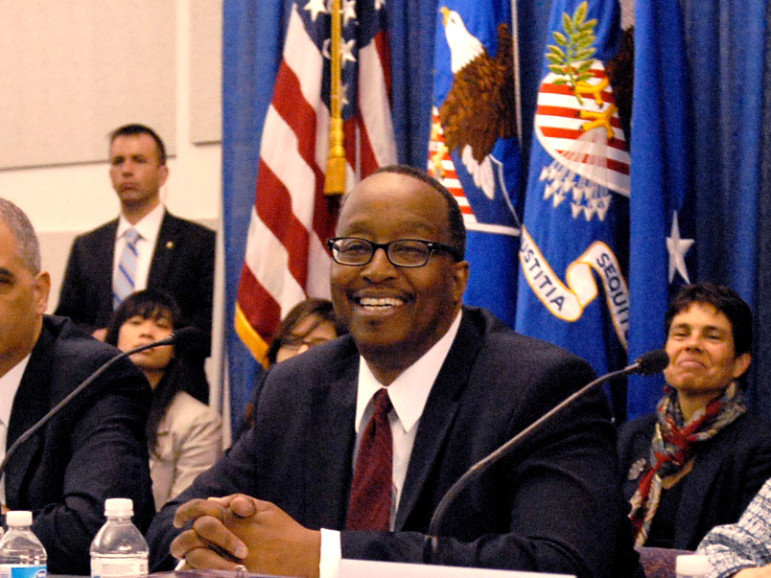
DOJ
OJJDP Administrator Robert Listenbee
WASHINGTON — The federal government wants to help states eliminate the use of solitary confinement for juvenile offenders.
The Office of Juvenile Justice and Delinquency Prevention plans to host a meeting for states to consider how to move away from putting youth in isolation.
“Our goal is to eliminate the practice,” said Robert Listenbee, OJJDP administrator, during a speech at the annual Coalition for Juvenile Justice conference Friday.
Earlier this year, President Obama announced solitary confinement no longer would be used for juveniles in federal custody, a move supporters hoped would encourage action in the states, where most juveniles are held.
More broadly, Listenbee applauded reforms across the country that are moving from a juvenile justice model that emphasizes punishment to one focused on improving outcomes for juveniles.
“They should leave the system better than they were when they came,” he said.
Researchers have found solitary confinement can cause depression, anxiety and psychosis and that youth are particularly vulnerable because they are still developing. More than half of all suicides in juvenile facilities occurred while young people were held in isolation.
[Related story: Stop Solitary for Kids Aims to Build on State, Federal Momentum]
In a separate session on the use of solitary confinement, experts discussed the nuances of ending solitary.
Kim Godfrey, executive director at the PbS Learning Institute, said it would be helpful to have data that show why youth are being sent to solitary confinement, such as for punishment or because there is insufficient staffing. Each of those reasons will require different interventions.
Another consideration should be how the use of solitary confinement affects juveniles who are not placed in isolation but see their peers being subjected to it, said Jennifer Woolard, associate professor and co-director of the graduate program in developmental science at Georgetown University.
Listening to youth
Across the conference’s sessions, speakers emphasized the importance of listening to youth’s voices, whether a judge is trying to figure out how to help a teenager or formerly incarcerated youth are making the case for reforms to lawmakers.
Starcia Ague, an administrator in Washington state’s Juvenile Justice Rehabilitation Administration who spent time in the justice system as a teenager, said advocates and policymakers should be sure youth are given a real voice, not just used to make a point.
“I want to have a seat at the table — really have a seat at the table,” she said.
Ramon Leija, a coordinator at Eastern Coachella Valley Boys and Men of Color in California, who has also experienced the system, urged advocates and others to allow themselves to be vulnerable when they’re working with youth if they hope to connect with them.
“Young people can tell who’s real,” he said.
More related stories:
Solitary Confinement: Traumatising But Useless
Solitary Reform Shows Power of Brain Science to Change Policy
Thank you for publishing this important story. In alignment with the growing call for elimination of solitary confinement for juveniles, the National Commission on Correctional Health Care recently issued a position statement on solitary confinement to help correctional health professionals address this issue. NCCHC is the nation’s leading authority on health care systems in jails, prisons and juvenile detention facilities.
The 17-point statement calls for an end to solitary confinement of any duration for juveniles, mentally ill people and pregnant women. For others, it states that prolonged solitary confinement, ‘prolonged’ being defined as longer than 15 consecutive days, should not be used.
View the complete statement here: http://www.ncchc.org/solitary-confinement-position-statement